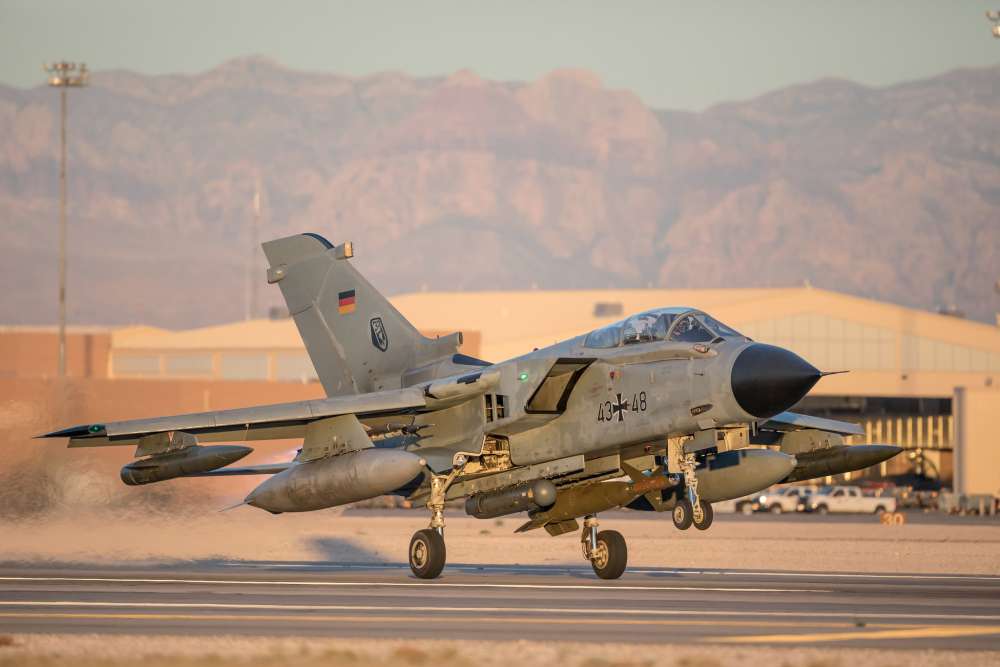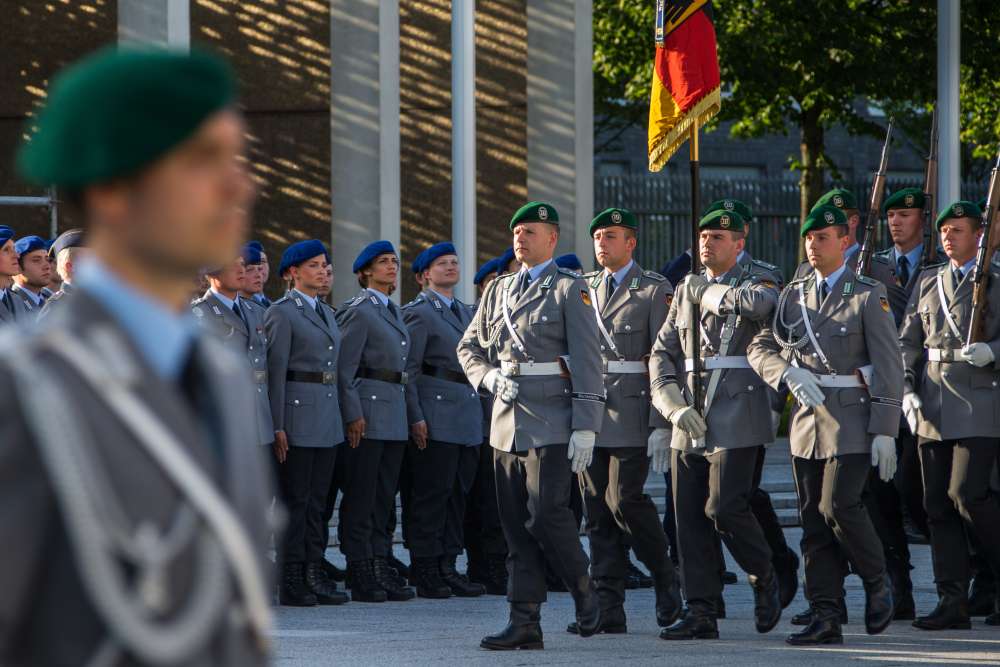Germany’s Zeitenwende: Wind of Change or Hot Air?

(Bundeswehr /Flickr)
The Zeitenwende has revealed many shortcomings in Germany’s armed forces. Why Berlin should move past intellectual passivity and financial constraints to reposition Germany as the security powerhouse of Europe.
To successfully implement the announced Zeitenwende in its security policy, Germany is facing immense strategic, political and societal challenges. These issues include the significant financial efforts required to create a modern, combat-ready and deployable Bundeswehr, the existing institutional and intellectual barriers to establishing Germany as a European central power in security matters with a corresponding strategic culture, and the further development of a societal consensus on Germany’s role in the world.
In the future, Germany must be able to act earlier, faster and more decisively to provide credible security for its European partners. To do so, Berlin should consider how it can make further institutional adjustments in addition to its upcoming National Security Strategy – particularly through establishing a National Security Council (NSC) modeled after the United States. The recently failed attempt to institute such a body in Germany was largely due to the Chancellery under Olaf Scholz (Social Democratic Party) and the Foreign Ministry led by Annalena Baerbock (Green Party) failing to agree where a German NSC should be located. The need for institutional reform nonetheless remains, as the purpose of a German NSC would be to better ensure the planning, coordination and implementation of an integrated foreign, security and defense policy. The war in Ukraine has shown the deficits within the German Federal Government, such as in areas like strategic communication, crisis response and interdepartmental coordination. The existing system for planning and coordinating German security policy – which is primarily based on the regular sessions of state secretaries, ad hoc meetings of the security cabinet and sessions within the largely export-oriented German Federal Security Council (BSR) – is clearly reaching its limits. Germany’s common practice of forming coalition governments and the principle of departmental responsibility (Ressortprinzip) means that the US model of a White House National Security Council cannot be directly transferred to Berlin. Nonetheless, it should be possible to adopt improvements in Germany’s executive branch at the highest level of strategic planning.
Key Points:
- Given NATO’s strategic deterrence against Russia, Germany should increase its defense spending target and strengthen its strategic communication, crisis response and interdepartmental coordination.
- For the Zeitenwende to succeed, more investments should be directed to security research to foster a continuous exchange of ideas and move beyond ingrained dogmas of military restraint and passivity.
- A key component of a functional Zeitenwende must be to redefine national security in a way that understands military strength as a demonstration of Germany’s responsibility toward its partners.
Investing in the Bundeswehr
The spectrum of Germany’s military tasks is wide: examples include credible conventional deterrence of Russia on NATO’s eastern flank with quickly deployable and durable land, sea and air forces using state-of-the-art equipment, a continuation of Germany’s nuclear sharing efforts, and the development of military capabilities in space and cyberspace. Germany’s military commitment to European security also involves the further armament of Ukraine with artillery, air defense systems, infantry fighting vehicles, and modern main battle tanks from German manufacturers. All this will mean significant financial investments in the Bundeswehr in the coming years and decades: from procuring new combat aircraft and helicopters (F‑35, CH-47 and Future Combat Air System), to upgrading the Navy with additional frigates (F‑126, F‑127), corvettes (2nd batch K130) and submarines (U212CD), to restructuring the Army with numerous newly acquired systems in areas like wheeled armored vehicles, artillery and mobile short-range air-defense systems. These capabilities were either severely cut back during the decades of Germany’s ‘peace dividend’ (such as the number of artillery units) or have been lost completely. Significant funds will need to be allotted for the digitalization of command, control and communications equipment as well as for increasing the Bundeswehr’s paltry ammunition reserves – which are currently only sufficient to sustain high-intensity combat for roughly two days. The official NATO target to invest 2% of GDP in defense by 2024 is likely to be the material and financial minimum of what Germany must invest to actually turn the Bundeswehr into the most modern and powerful armed forces in Europe – a goal repeatedly announced by Chancellor Olaf Scholz – and to meet NATO’s increased military requirements.
» Given NATO's strategic realignment toward conventional deterrence against Russia on the alliance's eastern flank, a defense spending target of 3% of GDP does not seem wholly unrealistic in the future. «
Given NATO’s strategic realignment toward conventional deterrence against Russia on the alliance’s eastern flank, a defense spending target of 3% of GDP does not seem wholly unrealistic in the future. Some countries like Poland have already taken measures to increase their defense budgets accordingly. For Germany, such a budget increase would bring defense expenditures back to the levels of the 1980s when the Bundeswehr maintained one of the strongest conventional fighting forces within NATO. In any case, the special 100 billion euro fund announced by Chancellor Scholz as part of his Zeitenwende speech is not even close to enough to ensure a successful modernization of the Bundeswehr. Given the steadily increasing personnel and operating costs alone, Germany will have to agree to a structural increase in its defense budget.
A Deeper Understanding of Zeitenwende
Last but not least, a successful Zeitenwende is also about expanding and promoting academic and non-academic security research – which unfortunately only exercises a rather niche existence in Germany. Additional research funding, professorships, postdoc positions, and degree programs focused on security studies – including critical security studies – would be a very welcome outcome of the Zeitenwende. Furthermore, an even closer and more continuous exchange of ideas between researchers in peace, conflict and security studies, relevant think tanks, policymakers in the relevant federal ministries and parliament, as well as the committees and specialist politicians from Germany’s main political parties, would be desirable.
» A successful Zeitenwende is also about expanding and promoting academic and non-academic security research. «
At the same time, the Zeitenwende also faces the challenge of responding to philosophers like Jürgen Habermas and other German intellectuals who have either opposed weapons deliveries to Ukraine outright or, like Habermas, have criticized the ‘emotionalization’ and ‘militarization’ of the discourse in Germany, while simultaneously lauding the cautionary course of Scholz. At the polar end of this spectrum exist voices like far-left politician Sarah Wagenknecht and feminist publicist Alice Schwarzer, whose mobilization of anti-war sentiment reflects a peculiar form of collective narcissism and moral self-aggrandizement that refuses to acknowledge Ukraine’s national sovereignty, territorial integrity and political freedom as liberal and democratic values worth fighting for. The mantra of ‘security with Russia, never security against Russia’ lives on in many German circles, which include the nationalist populist Alternative for Germany (AfD) party, large parts of the Linke party, and among prominent left-wing pacifist intellectuals. These actors share an appeasement mentality that essentially views Ukraine in total or in parts as a territorial bargaining chip to trade in return for a cold peace with Putin. This callous disregard for Ukrainians’ most fundamental rights is fed by the same German egocentrism that has led the political establishment in Berlin to disregard the security concerns of the Baltic states and Poland for years, including through the stubborn insistence that the Nord Stream pipelines were a ‘purely economic project’.
Beyond the significant practical challenges of the Zeitenwende, Germany’s strategic reorientation also requires a discursive intervention in politics, academia and the media against the certainties and dogmas of the past – from Wandel durch Handel to Ostpolitik – and the mental flexibility and intellectual willingness to move away from culturally ingrained images of military restraint and foreign policy passivity that no longer fit the times we live in. This is not about the historical return of a saber-rattling, neo-Wilhelmine Germany or the ostentatious display of military strength as a vulgar show of force. There should be no German unilateralism or Sonderweg. Instead, the Zeitenwende must historically redefine Germany’s national security and understand military strength as a demonstration of Germany’s reliability and responsibility toward its friends and partners. Only with this redefinition of national security within the transatlantic and European alliances and the international community can the Zeitenwende successfully answer the geopolitical and strategic threats posed by the anti-democratic, neo-imperial and authoritarian powers of the 21st century.
Georg Löfflmann
Lecturer and Assistant Professor, School of Politics and International Relations, Queen Mary University of London
Weiterlesen

Zeitenwende: What Has Been Missing From the Conversation?
Russia’s war against Ukraine has sparked an active public debate about German and European security policy. But not all issues have gotten the same air time.

Fünf Ideen für eine bessere Bundeswehr
Deutschland braucht eine einsatzbereite und kampfstarke Truppe. Dafür muss die Bundeswehr ehrlicher planen, eigene Potenziale befähigen und realitätsnah üben.

It’s the Politics, Stupid: Lessons for Germany from US Security Strategies
A successful national security strategy needs a solid political foundation. In democracies, that foundation – for better or worse – rests on the electoral process and the political leaders it produces.